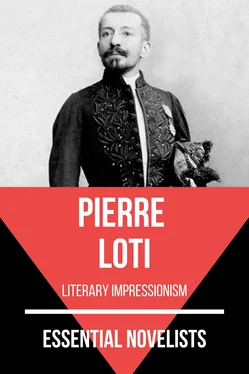1 ...6 7 8 10 11 12 ...18 Chrysantheme tends the flowers in our bronze vases, dresses herself with studied care, proud of her socks with the divided big toe, and strums all day on a kind of long-necked guitar, producing sweet and plaintive sounds.
CHAPTER VI. MY NEW MENAGE
––––––––
IN OUR HOME, EVERYTHING looks like a Japanese picture: we have folding-screens, little odd-shaped stools bearing vases full of flowers, and at the farther end of the apartment, in a nook forming a kind of altar, a large gilded Buddha sits enthroned in a lotus.
The house is just as I had fancied it should be in the many dreams of Japan I had had before my arrival, during the long night watches: perched on high, in a peaceful suburb, in the midst of green gardens; made up of paper panels, and taken to pieces according to one’s fancy, like a child’s toy. Whole families of cicalas chirp day and night under our old resounding roof. From our veranda we have a bewildering bird’s-eye view of Nagasaki, of its streets, its junks, and its great pagodas, which, at certain hours, is illuminated at our feet like some scene in fairyland.
CHAPTER VII. THE LADIES OF THE FANS
––––––––

REGARDED AS A MERE outline, little Chrysantheme has been seen everywhere and by everybody. Whoever has looked at one of those paintings on china or silk that are sold in our bazaars, knows perfectly the pretty, stiff head-dress, the leaning figure, ever ready to try some new gracious salutation, the sash fastened behind in an enormous bow, the large, flowing sleeves, the drapery slightly clinging about the ankles with a little crooked train like a lizard’s tail.
But her face—no, not every one has seen that; there is something special about it.
Moreover, the type of women the Japanese paint mostly on their vases is an exceptional one in their country. It is almost exclusively among the nobility that these personages are found, with their long, pale faces, painted in tender rose-tints, and silly, long necks which give them the appearance of storks. This distinguished type (which I am obliged to admit was also Mademoiselle Jasmin’s) is rare, particularly at Nagasaki.
Among the middle classes and the common people, the ugliness is more pleasant and sometimes becomes a kind of prettiness. The eyes are still too small and hardly able to open, but the faces are rounder, browner, more vivacious; and in the women remains a certain vagueness of feature, something childlike which prevails to the very end of their lives.
They are so laughing, and so merry, all these little Nipponese dolls! Rather a forced mirth, it is true, studied, and at times with a false ring; nevertheless one is attracted by it.
Chrysantheme is an exception, for she is melancholy. What thoughts are running through that little brain? My knowledge of her language is still too limited to enable me to find out. Moreover, it is a hundred to one that she has no thoughts whatever. And even if she had, what do I care?
I have chosen her to amuse me, and I should really prefer that she should have one of those insignificant little thoughtless faces like all the others.
––––––––

CHAPTER VIII. THE NECESSARY VEIL
When night comes on, we light two hanging lamps of religious symbolism, which burn till daylight, before our gilded idol.
We sleep on the floor, on a thin cotton mattress, which is unfolded and laid out over our white matting. Chrysantheme’s pillow is a little wooden block, cut so as to fit exactly the nape of her neck, without disturbing the elaborate head-dress, which must never be taken down; the pretty black hair I shall probably never see undone. My pillow, a Chinese model, is a kind of little square drum covered over with serpent-skin.
We sleep under a gauze mosquito-net of sombre greenish-blue, dark as the shades of night, stretched out on an orange-colored ribbon. (These are the traditional colors, and all respectable families of Nagasaki possess a similar net.) It envelops us like a tent; the mosquitoes and the night-moths whirl around it.
This sounds very pretty, and written down looks very well. In reality, however, it is not so; something, I know not what, is lacking, and everything is very paltry. In other lands, in the delightful isles of Oceania, in the old, lifeless quarters of Stamboul, it seemed as if mere words could never express all I felt, and I struggled vainly against my own inability to render, in human language, the penetrating charm surrounding me.
Here, on the contrary, words exact and truthful in themselves seem always too thrilling, too great for the subject; seem to embellish it unduly. I feel as if I were acting, for my own benefit, some wretchedly trivial and third-rate comedy; and whenever I try to consider my home in a serious spirit, the scoffing figure of M. Kangourou rises before me—the matrimonial agent, to whom I am indebted for my happiness.
JULY 12 th
––––––––

YVES VISITS US WHENEVER he is free, in the evening at five o’clock, after his duties on board are fulfilled.
He is our only European visitor, and, with the exception of a few civilities and cups of tea, exchanged with our neighbors, we lead a very retired life. Only in the evenings, winding our way through the steep, narrow streets and carrying our lanterns at the end of short sticks, we go down to Nagasaki in search of amusement at the theatres, at the tea-houses, or in the bazaars.
Yves treats my wife as if she were a plaything, and continually assures me that she is charming.
I find her as exasperating as the cicalas on my roof; and when I am alone at home, side by side with this little creature twanging the strings of her long-necked guitar, facing this marvellous panorama of pagodas and mountains, I am overcome by sadness almost to tears.
CHAPTER X. NOCTURNAL TERRORS
JULY 13TH.
––––––––
LAST NIGHT, AS WE REPOSED under the Japanese roof of Diou-djen-dji—the thin old wooden roof scorched by a hundred years of sunshine, vibrating at the least sound, like the stretched-out parchment of a tomtom—in the silence which prevails at two o’clock in the morning, we heard overhead a sound like a regular wild huntsman’s chase passing at full gallop.
“Nidzoumi!” (“The mice!”) said Chrysantheme.
Suddenly the word brings back to my mind yet another phrase, spoken in a very different language, in a country far away from here: “Setchan!” a word heard elsewhere, a word that has likewise been whispered in my ear by a woman’s voice, under similar circumstances, in a moment of nocturnal terror—“Setchan!” It was during one of our first nights at Stamboul spent under the mysterious roof of Eyoub, when danger surrounded us on all sides; a noise on the steps of the black staircase had made us tremble, and she also, my dear little Turkish companion, had said to me in her beloved language, “Setchan!” (“the mice!”).
At that fond recollection, a thrill of sweet memories coursed through my veins; it was as if I had been startled out of a long ten years’ sleep; I looked down upon the doll beside me with a sort of hatred, wondering why I was there, and I arose, with almost a feeling of remorse, to escape from that blue gauze net.
Читать дальше













